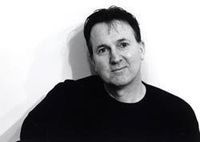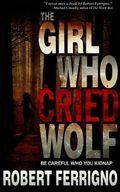Author R&R with Robert Ferrigno
 Before turning to writing full time, Robert Ferrigno worked as a college professor, a professional poker player and a newspaper
Before turning to writing full time, Robert Ferrigno worked as a college professor, a professional poker player and a newspaper
reporter. His first
novel, The Horse Latitudes, was called "the fiction debut of the
season" by Time magazine, and he's been nominated for an Edgar award
for Best Novel by the Mystery Writers of America, and awarded a Silver
Dagger for Best Short Story by the Crime Writers Association. His 13 thrillers have been published in 18 foreign languages. In addition to his writing, he currently works in
the videogames industry and would like to lose twenty
pounds and find a near-mint copy of Space Western #2 at a garage sale. His latest novel, The Girl Who Cried Wolf, is an eBook exclusive and follows the story of Remy, a Los Angeles entertainment lawyer who is kidnapped in Seattle by a group of environmentalist fanatics and held hostage in the vast and dangerous forests of Washington state. But in a tale reminiscent of O. Henry's "Ransom of the Red Chief," the kidnappers get more than they bargained for—the spoiled Remy demands a triple-espresso and a bowl of fresh raspberries and her wealthy father can't be
His latest novel, The Girl Who Cried Wolf, is an eBook exclusive and follows the story of Remy, a Los Angeles entertainment lawyer who is kidnapped in Seattle by a group of environmentalist fanatics and held hostage in the vast and dangerous forests of Washington state. But in a tale reminiscent of O. Henry's "Ransom of the Red Chief," the kidnappers get more than they bargained for—the spoiled Remy demands a triple-espresso and a bowl of fresh raspberries and her wealthy father can't be
reached because he's dodging subpoenas for insider trading. Rescue is up to Remy's boyfriend, an ex-cop with a short
temper, after he can't get the
FBI interested because Remy once faked her own kidnapping to run
off with the pool boy.
Ferrigno joins In Reference to Murder to take some Author R&R about the research and prep work he did for the novel:
After spending
a few years as a professional poker player, I moved from Florida to Southern
California to take up a career as a journalist. This gave me the opportunity to
meet and interview some very interesting people, from auto repo men to hot oil
bikini wrestlers to CIA agents. My time as a journalist helped me develop the skills
to make people feel comfortable enough to open up to me. There are many people
out there who are happy to talk to you. Because I usually don’t approach people
with an agenda, it’s just what I learned when I was a reporter, you just talk
to people, people will tell you things. They will tell you deep things.
Now, when I
work on a novel, I use the same techniques I learned as a journalist to shape
and craft the characters of my story. In particular, for The Girl Who Cried Wolf, I wanted to write a story about the
radical environmentalists that I run into across Seattle where I now make my
home. I love talking to people who are on the outer fringes of society and some
of the people in Seattle definitely fit that description.
My books give me an opportunity to encounter and interview people who don’t see
their own philosophies as extreme, and yet they definitely are extreme.
In the city
of Seattle, you can’t get a plastic bag at the grocery store. The people I
interviewed here really think the world is a filthy dirty place, there are all
these things that can kill you, and our bodies are filled with toxins. They
believe that life is an unclean proposition and there are a million pitfalls
waiting to snag us, whether that pitfall is a plastic bag or a soda.
So to get
character inspiration for The Girl Who
Cried Wolf, I talked to people who are a part of various green political movements.
There is a group called the black anarchists who wear black masks when they
trash a place. For example, the Nike store had all of their windows busted in a
few years ago by this group right before the walked into Starbucks to order a
macchiato. I was able to interview a few members of that group, who weren't
much interested in talking, but a good writer should be a good listener, and
listeners get talked to eventually.
So I interviewed
people who, for one thing, provide such great dialogue that it lights up the
page and gives the work an air of authenticity. It’s so great because they
don’t know it is dialogue. It is just the way they talk. Yet to those outside
of their immediate circles, it could almost sound like a different language. They
are just incredibly passionate, almost to an extreme degree, about their cause
and believe that the choices they are making about the environment are more
important than anything else in this world. Three of the main characters in the
novel are based off of these environmentalists. Glen, one of the key antagonists,
is based on a man I met who actually speaks as angrily and vindictively as the
character in the book.
For The Girl Who Cried Wolf, I also did do
some research on the chemical industry. Talk
about a very scary industry. There really are trucks full of dangerous chemicals
hurtling down the highway at 70 miles an hour. Every once in a while, you’ll
see a warning on the back of a truck saying it contains toxic materials, but it
is in really small type and you have to know what you’re looking for. These are
like powder kegs driving down the highway all around us and we go on our merry
ways, completely confident that everything will work out. Sometimes it doesn't,
and that's where good fiction is found.
Being an
author definitely gives you the opportunity to research exciting topics and
interview very unique people. My novels have always been focused on exceptional
characters and exploring questions of makes the difference between a hero or a
villain, or good and evil decisions. My interviews and research allow me to get
to know the people and industries where these questions are posed every day and
choices matter in terms of which role a character will play in their own story.
—Robert Ferrigno
The Girl Who Cried Wolf is available now via Amazon and other eBook retailers. Follow Robert via his personal and eBook Facebook pages, as well as his blog.








